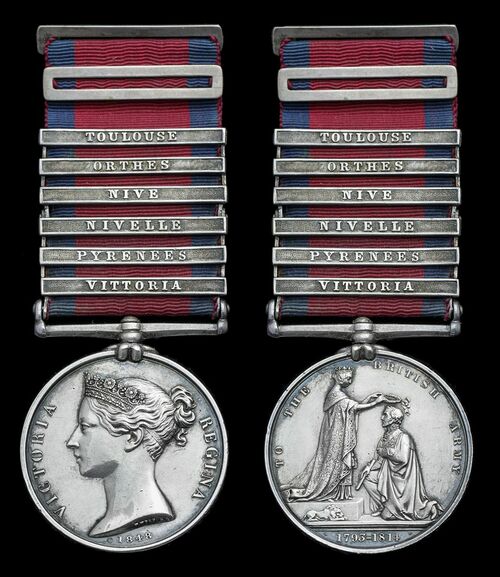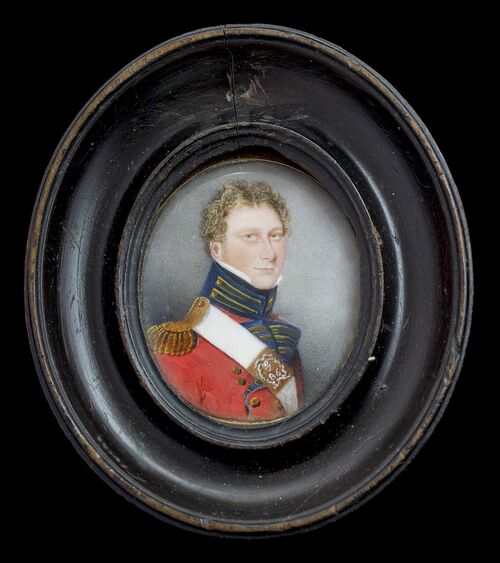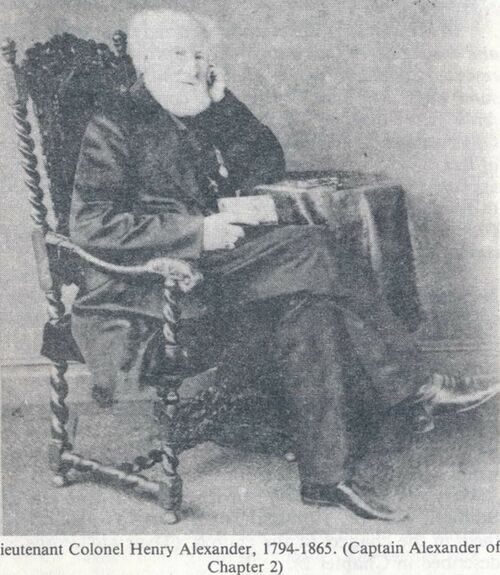Auction: 24002 - Orders, Decorations and Medals
Lot: 30
Sold by Order of the Family
The Military General Service Medal awarded to Lieutenant-Colonel H. Alexander, 28th (North Gloucestershire) Regiment of Foot who, as a young subaltern in that regiment, was wounded in action during the decisive Battle of Vittoria in 1813
Military General Service 1793-1814, 6 clasps, Vittoria, Pyrenees, Nivelle, Nive, Orthes, Toulouse (H. Alexander, Lieut 28th Foot.), mounted upon a contemporary silver buckle and pin, contained in a brown leather case of some age, minor contact wear, overall very fine
Only three 6-clasp Medals awarded to officers of the 28th (North Gloucestershire) Regiment of Foot, this being a unique combination and to the only Lieutenant - the remaining medals to a Quarter Master and Captain respectively.
Henry Alexander was born at Caister, Norfolk, circa 1794 and commissioned Ensign in the 28th Foot on 13 June 1811; this regiment saw much action and active campaigning during the entirety of Napoleonic Wars - from Corunna and Talavera through to Barrossa, Albuera and beyond via the disastrous Walcheren Expedition, the 1/28th were often in the thick of the fighting. Young Ensign Alexander was likely sent to the Iberian Peninsula in late 1811 or early 1812 to make up for casualties sustained at the bloody Battle of Albuera (16 May 1811) where the battalion lost six officers and 158 men killed and wounded - and indeed he was soon to become a casualty himself.
At the Battle of Vitoria (21 June 1813), the 1/28th were part of Colonel O'Callaghan's 3rd Brigade, positioned on the right flank of Wellington's allied army. Their objective was to take the village of Subijana de Álava and hold it against French counter-attacks, which was achieved after a significant amount of house-to-house fighting and undoubtedly a great deal of hand-to-hand combat. After expelling their opponents from the village, the Brigade attempted to advance further but were forced back by French reinforcements and the weight of fire brought to bear upon them: they held on to the village until the general advance against the retreating French, but the cost had been high...in the 28th alone, over 200 men had been killed or wounded and this number included half its officers - including Ensign Alexander.
His wound cannot, however, have been so serious as to keep him from the battalion for long as it is clear he fought with them throughout the Pyrenees Campaign right up to Toulouse, the final action of the war. The Light Company of the 28th were unfortunately all but wiped out during the fighting for the Maya Pass (25 July 1813); and at the crossing of the Nive (9 December) the regiment were again involved in clearing a small village to their front - but mercifully without the casualties sustained at Vitoria. Alexander, meanwhile, had been promoted Lieutenant on 26 August 1813 and appears to have remained with the 28th until November 1822, when he transferred (still as Lieutenant) to the 86th (Royal County Down) Regiment of Foot; though the 1/28th fought with distinction at the battles of Quatre Bras and Waterloo, Alexander is not recorded as present in Belgium for those momentous days.
Next noted as a Captain on Half-Pay (August 1825), he joined the 84th (York and Lancaster) Regiment of Foot - again as Captain - on 8 June 1826 before moving three years later to the Royal Staff Corps. Though the Regimental History of the York and Lancaster Regiment suggests he died in 1857, this is clearly an error as he actually died on 30 September 1865 at Beckenham in Kent; the father of at least seven children, sadly all but two appear to have predeceased him - though one of his daughters (who lived until 1914) was rather charmingly given the first name of 'Vittoria'.
Sold together with a charming and well-executed portrait miniature of the recipient, 106mm x 90mm including wooden frame, in the post-Napoleonic era uniform of an officer of the 86th Foot (as clearly evidenced by his shoulder-belt plate) and thus can be dated circa 1822-25. Upon the reverse a card label states: 'Colonel Henry Alexander, my great great grandfather', and this is also accompanied by a family letter - dated 1954 - with some further notes of provenance through generations of the same family. For Alexander's sword, likely carried during the Peninsular War, see Lot 32; and for his officer's silk sash, likely worn during the same conflict, see Lot 31.
Subject to 20% VAT on Buyer’s Premium. For more information please view Terms and Conditions for Buyers.
Sold for
£5,200
Starting price
£2400









